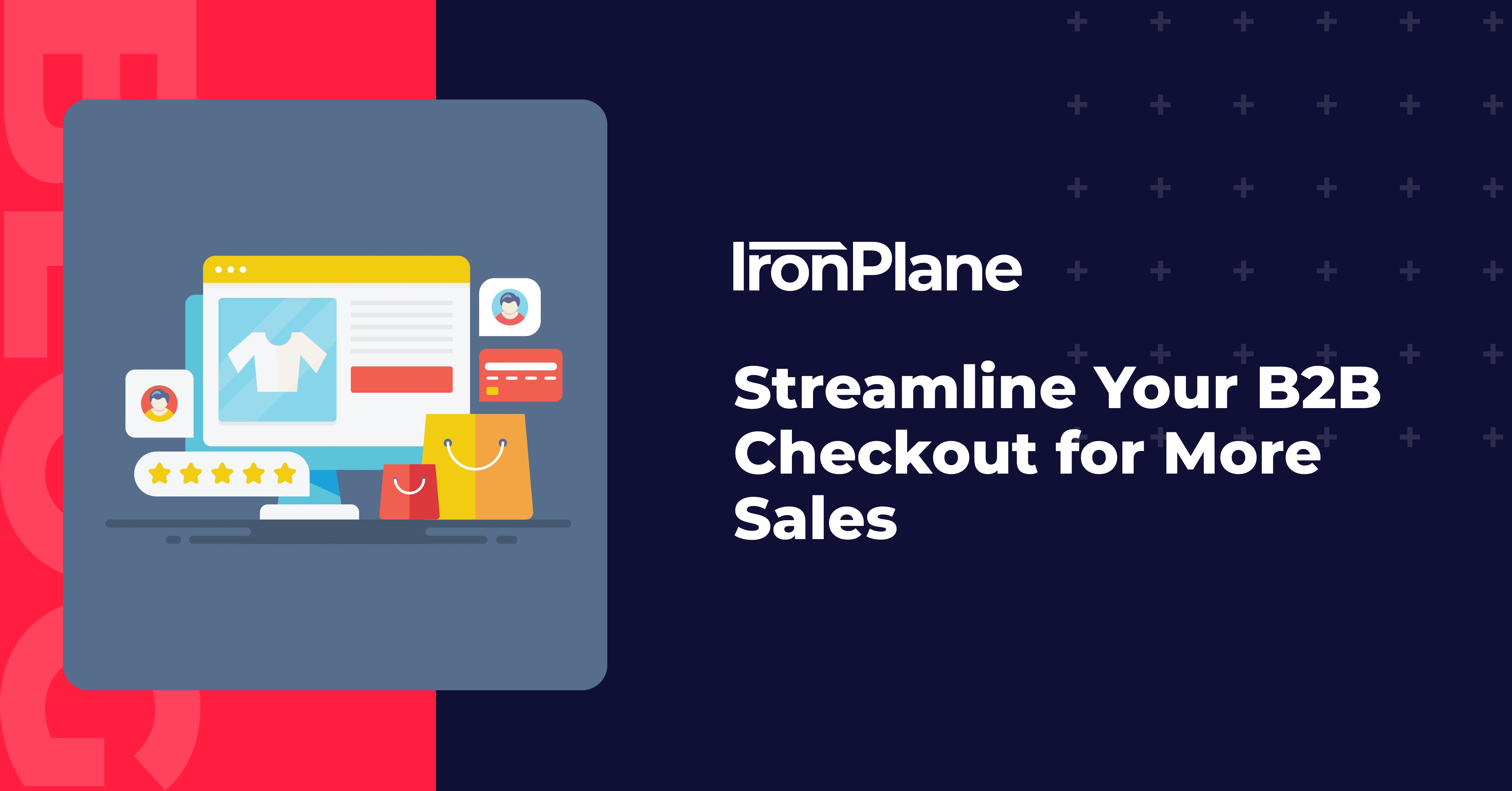Streamline Your B2B Checkout for More Sales
Let's look at ways to make your B2B checkout easier and get more customers to buy. We'll see how these ideas can help you make more money and make customers happier.

Photo by Myriam Jessier on Unsplash
When most people think of eCommerce, they think of B2C companies — retailers large and small, from the Amazons and Wayfairs of the world to the small retailers expanding beyond local brick-and-mortar to reach new online audiences.
But over the past few years, more and more B2B businesses are also discovering concrete value from investing in their online presence. In fact, McKinsey reports that roughly 65% of B2B companies across all industries exclusively transact online, and Statista estimates that the North American B2B eCommerce market will exceed $4,600 billion by 2025.
What’s behind this transformation?
A number of factors have influenced this shift, but a major reason is that the B2B buying process has changed. Buyers are accustomed to making online purchases. They like the freedom of not talking to a salesperson and the ease of eCommerce checkout.
With this shift and the rise of remote work, investing in in-person sales has become less and less cost-efficient, and eCommerce platforms have become a more appealing way to drive efficiency, personalization, better profit margins, reliable delivery, and more.
To bring these benefits to life, let’s examine the advantages of B2B eCommerce in the context of an existing B2B company that has yet to embrace digital transformation: Global Certified Fasteners.
If your B2B business is considering your own digital transformation, it is important to understand that not all eCommerce platforms support the B2B business features described in this article. IronPlane implements all of our B2B client solutions on the Magento Open Source or Adobe Commerce platforms. We also view BigCommerce’s Enterprise B2B features as similarly capable for most B2B needs.
We randomly selected Global Certified Fasteners - a traditional B2B business with limited or no commerce functionality in order to describe potential challenges and opportunities for building out a B2B commerce platform. According to their website, Global Certified Fasteners has provided excellent fastener solutions for distributors and OEMs for 50 years.
The private company has established deep relationships with its customers and manufacturing partners and sells a wide range of products, from communication tower step bolts to rivets to specialty fasteners to automatic screw machine parts. Global Certified Fasteners also offers technical assistance, special packaging, prototype production runs, and contract assembly services.
Their website reflects a focus on a traditional sales and support approach rather than an investment in the online space. The online product descriptions are sparse and don’t include photos and the services page is light with no testimonials or case studies for customers and partners to browse.
From the outside looking in, a greater focus on their online presence could:
Although their existing website is a start, embracing eCommerce could help Global Certified Fasteners expand their total addressable market, streamline their backend processes, and improve customer satisfaction.
While some members of the Global Certified Fasteners team may be resistant to change, the outsized impacts of adding an eCommerce element to their overall strategy would be well worth the time and effort. Let’s take a look at just 7 of the reasons why:
1. Scalability: Selling online requires a solid foundation of accurate product data and images as well as a robust platform that can be customized to your unique business requirement. Once in place, a B2B commerce presence is highly scalable and evolves with a business’ growth - making products and services more accessible to a wider audience with optimal efficiency.
2. International Capabilities: If a business is expanding internationally, an online presence can quickly adapt to each new market with various translation, shipping, customs, and tax management integrations. For example, IronPlane helped aircraft tool supply company, Yardstore with a Zonos integration to expand into new markets while reducing the customs burden for those new customers.
3. Reduced Inventory: eCommerce sites empower B2B merchants to look into dropshipping from manufacturers rather than storing all inventory in their own facilities. Similarly, multi-inventory sources can easily be integrated to improve shipping costs and delivery times. Reducing physical space — and the staff that was originally needed to support it — gives these companies budget to allocate toward an online go-to-market strategy.
4. Better Supplier and Customer Communication: Most B2B businesses depend on email or in-person meetings for customer and supplier communications. Because eCommerce platforms can integrate directly with CRMs and even offer customer portals, customers can get the information they need when they need it through automated communications, support tickets, or FAQ pages.
Take Omni International, Controtek, or Gat Creek. IronPlane helped all three companies launch portals dedicated to their B2B clients, who get customized pricing for buying supplies and furniture in bulk.
5. Real-time Data: Many eCommerce platforms have built-in data analytics or integrate with analytics providers to show how customers behave. Tracking online interactions in real-time allows B2B companies to brainstorm strategies for improving their customer experiences and measure the outcomes of those experiments.
IronPlane helped packaging and shipping supplier, Packaging Price, make significant UI and UX improvements to their customer experience through their eCommerce site. With clear customer messages during the cart and checkout process, customers were more aware of benefits like free shipping or local pickup and knew immediately if their orders would be delayed or back-ordered.
6. Better Product Displays: Having an online eCommerce store gives B2B businesses the opportunity to support far more SKUs in a more streamlined manner. Instead of their sales teams carrying samples to show potential customers, the company can invest in a robust Product Information Management system, or PIM, that can store and distribute in-depth product descriptions and useful photos across all of the company’s sales and marketing channels. Whenever the product changes or a new product is introduced, the company can simply add it to the PIM and know the new information will be available on all of their channels.
B2B businesses can also increase the appeal of their products with emerging AR and VR technology. IronPlane helped furniture retailer Gat Creek implement Threekit, a visualization platform. Today, B2B customers can see how pieces might fit in particular spaces through AR and look at how all of Gat Creek’s color and finish customization options might look through VR.
7. Integrations: B2B companies often have a long list of backend systems — from ERPs to CRMs, to inventory management solutions, to payment gateways. An eCommerce platform like Magento provides a highly customizable environment that can be connected to all of these tools, seamlessly pushing product, order data, and content to and from each system. Integrations offer a great deal of opportunity only if they are designed thoughtfully and implemented skillfully. IronPlane has worked with a variety of ERPs including Epicor, Sage, Netsuite, Oracle for B2B clients in a variety of industries.
It’s clear that B2B eCommerce is here to stay — for good reason. Companies embracing the power of B2B eCommerce are reaping the benefits of increased scalability, enhanced operational efficiencies, faster time to market, higher revenues, and improved customer satisfaction.
Are you ready for your own digital transformation?
Let the experts at IronPlane help guide you through the process. We’ve created, migrated, and supported B2B eCommerce sites for over ten years and are eager to chat with folks about their B2B digital transformation.
Sign up for a free eCommerce platform consultation to set your project off on the right foot, or read one of our articles to familiarize yourself with our approach:

Let's look at ways to make your B2B checkout easier and get more customers to buy. We'll see how these ideas can help you make more money and make customers happier.

Explore the benefits of Magento B2B development and learn how B2B companies turn to the platform for increased efficiency and higher conversion rates.

Gat Creek turned to IronPlane to help them create a B2B B2C website with a custom product visualizer. We worked to create a site that met the needs of this unique company.